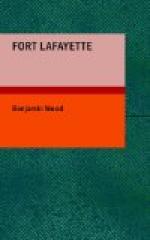CHAPTER XXI.
On the evening of the 20th July, Hunter’s division, to which Harold Hare was attached, was bivouacked on the old Braddock Road, about a mile and a half southeast of Centreville. It was midnight. There was a strange and solemn hush throughout the camp, broken only by the hail of the sentinel and the occasional trampling of horses hoofs, as some aid-de-camp galloped hastily along the line. Some of the troops were sleeping, dreaming, perhaps, of home, and far away, for the time, from the thought of the morrow’s danger. But most were keeping vigil through the long hours of darkness, communing with themselves or talking in low murmurs with some comrade; for each soldier knew that the battle-hour was at hand. Harold was stretched upon his cloak, striving in vain to win the boon of an hour’s sleep, for he was weary with the toil of the preceding day; but he could not shut out from his brain the whirl of excitement and suspense which that night kept so many tired fellows wakeful when they most needed rest. It was useless to court slumber, on the eve, perhaps, of his eternal sleep; he arose and walked about into the night.
Standing beside the dying embers of a watchfire, wrapped in his blanket, and gazing thoughtfully into the little drowsy flames that yet curled about the blackened fagots, was a tall and manly form, which Harold recognized as that of his companion in arms, a young lieutenant of his company. He approached, and placed his hand upon his fellow-soldier’s arm.
“What book of fate are you reading in the ashes, Harry?” he asked, in a pleasant tone, anxious to dispel some portion of his own and his comrade’s moodiness.
The soldier turned to him and smiled, but sorrowfully and with effort.
“My own destiny, perhaps,” he answered. “Those ashes were glowing once with light and warmth, and before the dawn they will be cold, as you or I may be to-morrow, Harold.”
“I thought you were too old a soldier to nurse such fancies upon the eve of battle. I must confess that I, who am a novice in this work, am as restless and nervous as a woman; but you have been seasoned by a Mexican campaign, and I came to you expressly to be laughed into fortitude again.”
“You must go on till you meet one more lighthearted than myself,” answered the other, with a sigh. “Ah! Harold, I have none of the old elasticity about me to-night. I would I were back under my father’s roof, never to hear the roll of the battle-drum again. This is a cruel war, Harold.”
“A just one.”
“Yes, but cruel. Have you any that you love over yonder, Harold? Any that are dear to you, and that you must strike at on the morrow?”
“Yes, Harry, that is it. It is, as you say, a cruel war.”
“I have a brother there,” continued his companion; and he looked sadly into the gloom, as if he yearned through the darkness and distance to catch a glimpse of the well-known form. “A brother that, when I last saw him, was a little rosy-cheeked boy, and used to ride upon my knee. He is scarce more than a boy now, and yet he will shoulder his musket to-morrow, and stand in the ranks perhaps to be cut down by the hand that has caressed him. He was our mother’s darling, and it is a mercy that she is not living to see us armed against each other.”




